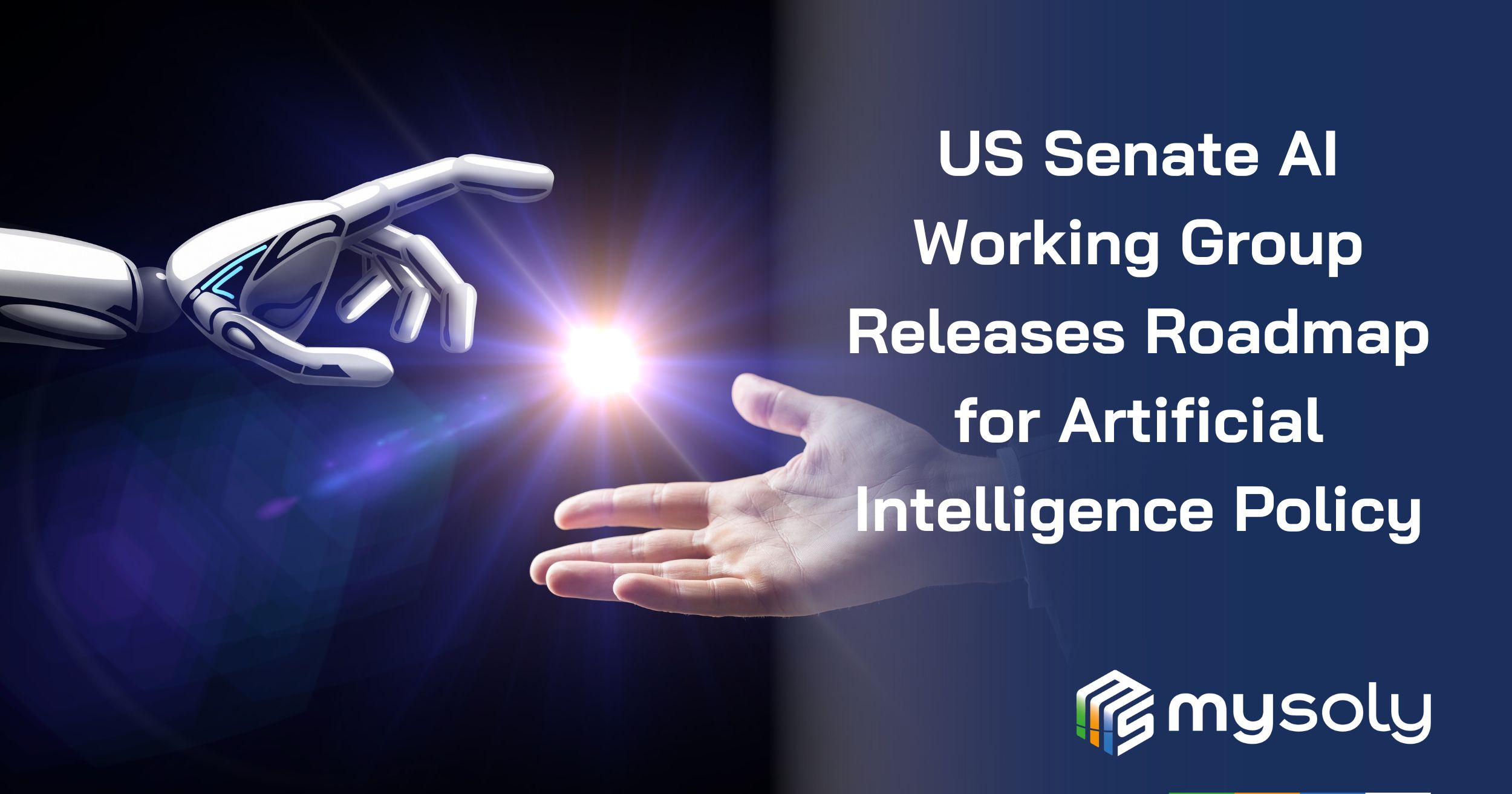US Senate AI Working Group Releases Roadmap for Artificial Intelligence Policy
Introduction
On May 15, 2024, the Bipartisan Senate AI Working Group, including Senate Majority Leader Chuck Schumer (D-NY) and Senators Mike Rounds (R-SD), Todd Young (R-IN), and Martin Heinrich (D-NM), published a comprehensive report titled “Driving U.S. Innovation in Artificial Intelligence: A Roadmap for Artificial Intelligence Policy in the United States Senate.” This report outlines a detailed framework to address the various opportunities and challenges of AI technologies. The roadmap emphasizes bipartisan collaboration and public-private partnerships to ensure AI development is both innovative and ethical.
Promoting AI Innovation
The roadmap underscores the importance of promoting AI innovation. It aims to ensure that educational institutions and businesses can compete in AI development regardless of size. So, funding the National AI Research Resource is a crucial step in this direction. This resource will support AI researchers and developers, facilitating groundbreaking advancements. To foster competition, the roadmap calls for policies that support institutions of higher education and companies of varying sizes. This not only drives technological advancements but also ensures that diverse perspectives contribute to the development of AI technologies.
Investing in research and development is another key priority. The roadmap for Artificial Intelligence recommends an annual investment of at least $32 billion for non-defense AI innovation. This aligns with the National Security Commission on Artificial Intelligence’s recommendations.
Workforce Development
Preparing the workforce for an AI-driven economy is also crucial. The roadmap advocates for implementing training programs that equip workers with the necessary skills. These programs address potential job displacement due to AI technologies. Moreover, workforce development initiatives ensure that workers can thrive in an AI-enabled economy.
In addition, the roadmap emphasizes the need for comprehensive training and upskilling programs. These initiatives will help workers adapt to the changing job market. By providing opportunities for continuous learning, the workforce can remain competitive and resilient. This approach not only benefits individual workers but also strengthens the overall economy.
While AI technologies create new opportunities, they also pose challenges related to job displacement. The roadmap highlights the importance of addressing these challenges proactively. By implementing targeted policies and support systems, the United States can mitigate the impact of job displacement and ensure a smooth transition for affected workers.
Development and Enforcement of AI Laws and Guidelines
Establishing and enforcing ethical guidelines is one of the top priorities. The roadmap stresses the importance of addressing bias, privacy, transparency, and explainability in AI technologies. These principles are essential for ensuring the responsible development and deployment of AI.
Therefore, the roadmap for Artificial Intelligence policy calls for the establishment of clear ethical guidelines. These guidelines should address issues such as bias and discrimination in AI systems. By promoting fairness and inclusivity, AI technologies benefit all members of society.
Privacy and transparency are also critical components of ethical AI development. So, the roadmap advocates for policies that protect individuals’ privacy and promote transparency in AI systems. These measures build trust and confidence in AI technologies, As a result, they foster widespread adoption.
Intellectual Property
Protecting intellectual property is also essential in the AI era. The roadmap suggests evaluating the need for legislation that protects individuals’ names, images, likenesses, and voices from unauthorized use by AI technologies. This approach ensures that creators and innovators receive appropriate recognition and compensation for their work.
While protecting intellectual property is important, it is equally crucial to balance this with the need for innovation. The roadmap encourages policies that strike a balance between protecting creators’ rights and promoting technological advancements. By fostering a supportive environment for innovation, the United States can lead in AI development.
The roadmap emphasizes the importance of supporting creators in the AI landscape. By providing legal protections and support systems, the United States can ensure that creators continue to contribute to technological advancements. This approach not only benefits individual creators but also drives overall innovation.
Elections and Democracy
There are also some challenges posed by AI technologies to elections and democracy. Manipulated technologies, such as deepfakes, pose significant risks to election integrity. The roadmap underscores the need to study AI’s impact on content creators and protect the public from manipulated technologies.
Election integrity is another concern. The roadmap also calls for policies that address the risks posed by AI technologies, such as deepfakes.
On the other hand, content creators play a vital role in the democratic process. The roadmap emphasizes the importance of supporting these creators and addressing the challenges they face in the AI era.
Privacy and Liability
Privacy and liability are significant concerns in the AI landscape. The roadmap recognizes the importance of addressing these issues comprehensively. It supports the establishment of a federal data privacy law to provide robust protections for individuals. The law is essential for addressing privacy concerns in the AI era.
Managing AI-Related Risks
Managing AI-related risks is crucial for ensuring the safe and ethical use of AI technologies. There should be the development and standardization of risk testing and evaluation methodologies. Risk testing and evaluation are essential for identifying and mitigating potential harms associated with AI technologies. AI systems should be thoroughly evaluated before deployment, minimizing risks to users and society.
On the other hand, red-teaming and AI auditing are critical components of risk management. So, the roadmap supports the implementation of these practices to identify vulnerabilities and ensure compliance with ethical guidelines.
National and Cyber Security
Leveraging AI technologies to bolster national security is another key focus. The report highlights the need to address national security threats, risks, and opportunities associated with AI. AI technologies have the potential to significantly enhance national security. So, there should be policies that leverage AI to address security threats and protect national interests.
Cyber security is a critical component of national security. The roadmap emphasizes the importance of addressing cyber security threats associated with AI technologies.
Research and Development
The roadmap for Artificial Intelligence Policy encourages cross-government AI research and development, involving various agencies and departments. Advancing research at the intersection of AI and national security, workplace safety, industrial efficiency, economic productivity, and competitiveness is essential.
Collaborative research is crucial for advancing AI technologies. The roadmap calls for cross-government research initiatives involving agencies such as the Department of Energy, Department of Commerce, National Science Foundation, National Institute for Standards and Technology, National Institutes of Health, and NASA.
Moreover, the roadmap highlights several focus areas for AI research and development. These include national security, workplace safety, industrial efficiency, economic productivity, and competitiveness.
Legislation
Integrating AI regulation into existing laws is a need. The report emphasizes the importance of transparency, explainability, testing, and evaluation in AI legislation.
AI regulation should be integrated into existing laws related to consumer protection and civil rights. By leveraging existing legal frameworks, we can ensure that AI technologies are developed and deployed responsibly.
Transparency, explainability, testing, and evaluation are guiding principles for AI legislation. These principles are important in ensuring the ethical development and use of AI. By promoting these values, we can build trust in AI technologies and protect users.
Conclusion
The AI Act or the EU AI Act was adopted by the Council Presidency and European Parliament negotiators on 9 December 2023. The law, which received a lot of criticism and support, became a reference source for the EU on AI. Also, it became the first legal regulation on AI in the world. [Click for details]
6 months after this development in the EU, a regulation called “A Roadmap for Artificial Intelligence Policy in the United States Senate” was announced in the USA. The US-Senate Artificial Intelligence Working Group’s roadmap represents an important step towards tackling the complexities of artificial intelligence. This roadmap for AI Policy lays a solid foundation for encouraging innovation while prioritizing ethical considerations.
We believe that the Senate AI Working Group’s roadmap for AI Policy provides a crucial framework for responsibly advancing technology. By emphasizing bipartisan collaboration, encouraging AI innovation, and addressing ethical considerations such as privacy and transparency, this roadmap not only supports technological advancement but also aims to ensure that AI benefits society as a whole. Investing in research, developing the workforce, and integrating strong AI laws are key steps towards supporting a sustainable and inclusive digital future.
EU Member States have made significant progress in drafting the EU AI Act. Meanwhile, the US continues to develop its regulatory framework and key aspects of its own Artificial Intelligence Act. Based on developments so far, the EU has a more significant risk-based approach to regulating artificial intelligence technology, while the US is trying to regulate the field without hindering the growth of the industry.
In conclusion, both legal regulations demonstrate the determination to address the challenges posed by the rapid evolution of artificial intelligence technology. As Mysoly, a company that develops AI-based LMS, we are aware of the need for such legislation and follow the developments closely.



